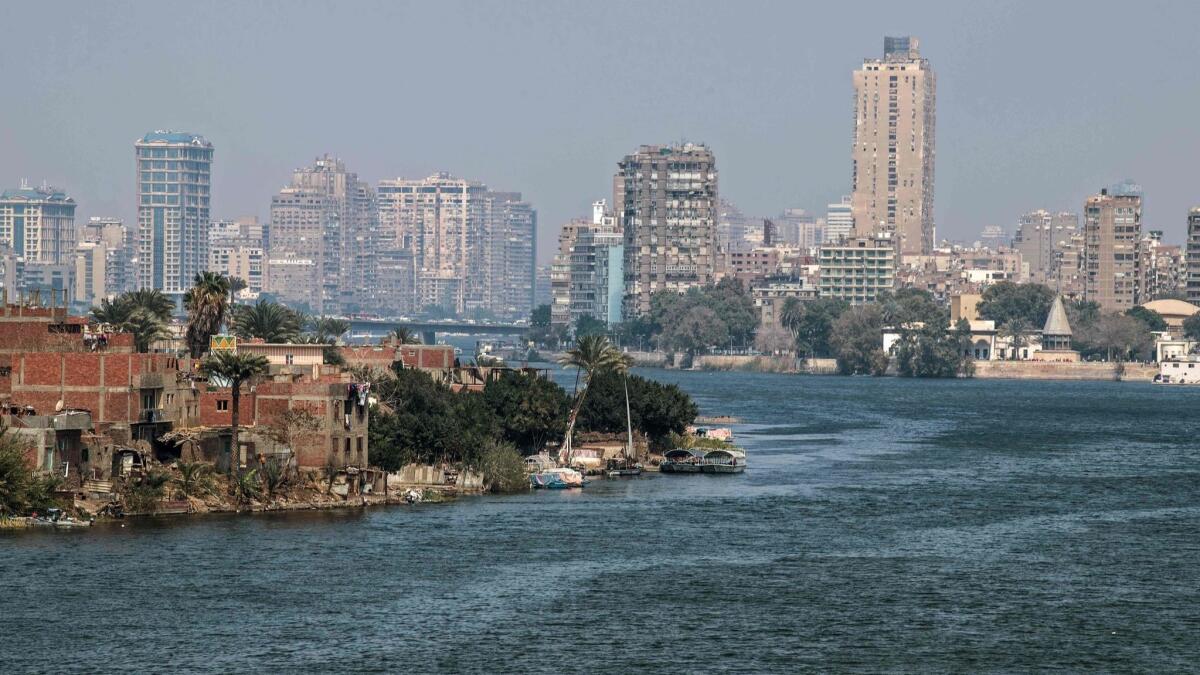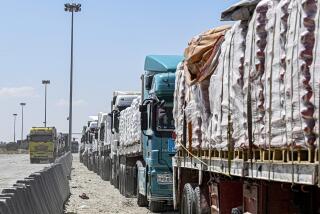The Ethiopians are building a massive dam, and Egypt is worried

- Share via
Reporting from Cairo — Since Ethiopia announced plans nearly a decade ago to build a massive hydroelectric dam along the Blue Nile tributary, the Egyptian government has waited in dread at the prospects that its freshwater lifeline could slow by as much as 25%.
Alternately threatening and negotiating, Egyptian officials have sought to scuttle or minimize the impact of the planned 6,450-megawatt facility. But the project has moved inexorably forward and construction, slowed by contracting corruption allegations, is nearly two-thirds complete.
With the dam now due to open next year, the specter of a military confrontation has waned and negotiators are instead debating how long the process of filling the dam should take — with Ethiopia planning to fill it in three years and Egypt asking for 15 years to better prepare for the future.
“We don’t have any other resource in Egypt except the Nile water,” warned professor Nader Nour el-Din, a soil and water expert at Cairo University. “This will harm Egypt.”
It has long been said that without the River Nile, there would be no Egypt.
Running the length of the country from its southern border with Sudan north into the Mediterranean Sea, the Nile provides more than 90% of Egypt’s fresh water. Though mainly a desert, Egypt has been gifted with a fertile strip along the Nile for farming and water. Roughly 95% of the nation’s people reside in the Nile Valley.
With the country already facing major water and food scarcities, the Grand Ethiopian Renaissance Dam, or GERD — set to be the biggest hydropower plant in Africa — is regarded as a national security threat as well as a stain on Egypt’s historical dominance of the revered river.
The Nile, Egypt’s lifeline in the desert, comes under threat »
Some experts have predicted a loss of more than half the farmland in a country with a population approaching 100 million.
“Egypt produces only 50% of the food needs of the total population,” said Gamal Siam, an agricultural economist at Cairo University. “Even without the dam, we will have more shortages because with the increasing population the water available for irrigation is decreasing.”
As it stands, Egypt is already below the United Nations’ water poverty threshold, with the dam endangering the livelihoods of half of the country’s population who work directly or indirectly in agriculture, said Nour el-Din, the soil and water expert.
In Ethiopia, on the other hand, the $4-billion dam is being hailed as a national achievement as big as Aswan High Dam in Egypt was in the 1960s. Nour el-Din insists it’s unfair to compare the two.
“We are a downstream country,” he said, “we are the end country and there is no other country after us.”
Egypt gets 85% of its water share from the Blue Nile that has its source in Ethiopia’s Lake Tana and just 15% from the White Nile. The two tributaries meet in the Sudanese capital, Khartoum, before the river moves on to Egypt.
Egyptians have for centuries enjoyed the lion’s share of the Nile’s water, a status confirmed by colonial-era agreements of 1902 and 1929 made by the British and a 1959 bilateral treaty between Egypt and Sudan. The latter allocated Egypt 55.5 billion cubic meters of Nile water and Sudan 18.5 billion cubic meters.
The Ethiopians have long viewed the status quo as unfair as they seek to develop their own impoverished economy.
“Unfortunately, the Nile has never been governed by law nor common sense,” said Wondwosen Seide, an Ethiopian analyst based in Sweden, who was previously at the Intergovernmental Authority on Development — an eight-country trade bloc in Africa.
In 2011, while Egypt was in the throes of revolution, Ethiopia announced the dam construction project, aimed at extending electricity to the roughly 60% of Ethiopia’s population that has no access. The goal has been to transform Ethiopia into the region’s primary energy exporter.
The potential shift in geopolitics in northeast Africa resulted in a war of words.
In 2013, Egypt’s then-president, Mohamed Morsi, warned that if his country’s Nile water “diminishes by one drop then our blood is the alternative,” though he insisted he wasn’t “calling for war.”
“Between 2011 and 2017, Egyptian and Ethiopian leaders framed the GERD dispute in stark, hyper-nationalist terms and exchanged belligerent threats,” a report published last month by the International Crisis Group said. “Politicians in Cairo called for sabotaging the dam. Media outlets in both countries compared the two sides’ military strength in anticipation of hostilities.”
Over time, though, threats of bloodshed have receded.
“I don’t think both the Egyptian and Ethiopian government think ‘Nile War’ is possible. They have come a long way and passed a point of no return as far as war is concerned,” said Seide, the Ethiopian analyst.
The tension is “overblown,” agreed Tim Deedy, a researcher focusing on security issues at the Washington-based Tahrir Institute for Middle East Policy think tank.
The election last year of Ethiopia’s new prime minister, Abiy Ahmed, further minimized the possibility of conflict.
“Compared to his predecessor, Ahmed has proven much more successful in facilitating successful negotiations with Egypt and Sudan,” Deedy said, as evidenced by a tripartite agreement signed in May 2018 to continue dialogue in meetings every six months.
Egypt, Sudan and Ethiopia also agreed to set up a scientific committee to analyze the effects of filling the dam.
During a news conference in Cairo last year, Ahmed promised Egyptians, “I swear to God, we will never hurt you,” after Egyptian President Abdel Fattah Sisi pressed him to swear in front of the Egyptian people that he wouldn’t harm the country’s Nile water share.
Sisi, for his part, conceded there was no military solution and called ongoing talks a “breakthrough,” expressing a sense of optimism echoed by Sileshi Bekele, Ethiopia’s minister for energy, irrigation and electricity. “We managed to actually find a number of win-win approaches,” he said.
But progress toward an agreement on the key issue of the filling period of the reservoir behind the dam remains slow.
The focus is likely to be hampered by more immediate internal matters such as a current wave of nationwide protests in Sudan against its leader, Omar Hassan Ahmed Bashir. The demonstrations, which have gone on for more than 100 days, represent a threat to Bashir’s autocratic three-decade rule.
To a lesser degree, Ethiopia’s prime minister is having issues strengthening his political position.
Still, Ethiopian analyst Seide is optimistic that the dam dispute will be resolved and that the negotiations will have a “long-lasting, positive” effect on Egyptian-Ethiopian relations.
But before they get there, he added, there will be more “bumpy roads.”
Islam is a special correspondent.
More to Read
Sign up for Essential California
The most important California stories and recommendations in your inbox every morning.
You may occasionally receive promotional content from the Los Angeles Times.










